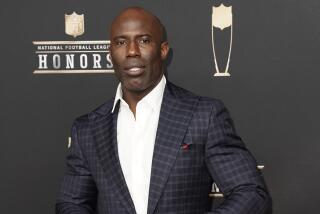Millard Reportedly Stymied NFL Drug Policy : Pro football: No action was taken because Viking player challenged the mandatory testing rule.
- Share via
The NFL and the Minnesota Vikings were forced to back off in enforcing a leaguewide drug policy last year when a player challenged a mandatory testing rule, according to a television report Wednesday night.
Defensive tackle Keith Millard declined to submit to further urinalysis because it violated Minnesota statutes prohibiting random testing of workers.
Instead of automatically suspending Millard for refusing a drug test under league policy, no action was taken, Roberta Baskin reported on the television news show, “Now It Can Be Told.”
On Oct. 2, 1991, Millard wrote to Viking President Roger Headrick, informing him: “I decline (to test) because the testing which you are attempting to conduct violates . . . Minnesota statutes.”
Millard, one of the league’s best defensive players before suffering a severe knee injury that has kept him out of action for much of the last two seasons, sent the letter to Lawrence S. Brown Jr., the NFL drug adviser, and Alan Page, Minnesota assistant attorney general.
Baskin reported that Millard tested positive for an illegal substance in 1988. As a result, Millard had to submit to “for cause” tests in the first step of the NFL’s three-step drug policy.
The Vikings declined comment on Millard. Under NFL policy, the names of players who test positive a first time are not made public. A second positive test results in a six-game suspension, and a third results in disqualification.
Millard’s challenge through the use of state law is one of the first such cases in the NFL.
But the delicate issue of drug testing in the workplace--a hotly debated subject within the realm of athletics--is not new. Instead, it is a thorny area that many organizations such as the NFL and the NCAA have been picking their way through.
“We would always find the (state or federal) laws would supersede our policies,” said Greg Aiello, NFL director of communications. “That’s a given. It’s a very complex area. We recognize that.”
At least 10 states have laws that regulate or restrict mandatory drug testing, said Ed Chin, staff attorney for the American Civil Liberties Union of Northern California.
Most of the laws limit testing to the kinds of jobs that affect public safety, such as air-traffic controllers or train engineers. Courts seem unconvinced that the same safety standards apply to athletic events.
“If (sports organizations) continue to try to escalate mass urinalysis drug testing and other forms of privacy invasion, I think they will run into (more legal) problems,” Chin said.
Millard’s case presents the NFL with a crisis. If the league cannot enforce its drug policy in Minnesota, then other teams might charge that the Vikings have an unfair advantage with respect to using performance-enhancing drugs.
And in the aftermath of Magic Johnson’s revelation that he tested HIV positive, mandatory testing for AIDS has become the focus.
“The issue is not that simple,” said the NFL’s Aiello. “And it’s not going away.”
More to Read
Go beyond the scoreboard
Get the latest on L.A.'s teams in the daily Sports Report newsletter.
You may occasionally receive promotional content from the Los Angeles Times.










